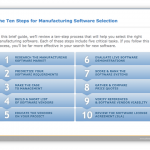ERP Solutions explained
People often are interested in knowing which are the Top 10 ERP Solutions available. This is a difficult question to answer because it depends upon the company that is asking the question and for what criteria. For example, if you are a manufacturer looking for an ERP solution, it would not only matter that you are in the manufacturing Industry but also which form of manufacturing are you; ie. Discreet, process or project-based manufacturing are all different with different Top 10 ERP offerings within their respective niche.
Probably the best way to answer the Top 10 ERP solution question is to define the overall ERP market leaders, who both have good track records as well as those who meet the Top 10 ERP criteria in many industries.
We have listed out the Top 10 ERP solutions that we see as market leaders. The big caveat here is that while they may be a market leader, they may not be right for your company. You should look carefully at any ERP vendor you evaluate and determine if they are truly a good fit for you.
Our Top 10 ERP Solutions
There are three tiers of ERP Software. These tiers refer to the size of the systems relative to the size of the companies. Tier 1 is the largest systems which support the largest companies. Tier 2 is the middle market solutions serving companies of about $50 Million in revenue up to $500 Million. Often these solutions are scaled so that they roll out individual installations on a plant by plant basis. Tier 3 is for those companies under $50 Million in revenue and is designed for smaller companies.
We will look at the Top 10 ERP solutions by Tier so as to give you a relative sizing of the systems. Keep in mind that the Tiers are only a general guide and that there is no rule that says a Tier 1 system cannot work in a Tier 2 client.
Tier 1 ERP Solutions
SAP
SAP is one of the market leaders in ERP software. Having been around since the early 1970’s SAP has implementations in many of the Fortune 500 and is well suited for global corporations. But this doesn’t mean that they don’t work locally and with smaller clients. They have put an emphasis in the last ten years on meeting the needs of the smaller company. By smaller, we mean the smaller corporations and companies whose annual revenue exceeds $50 Million per year. This is not a hard and fast rule, as now there are more offerings from SAP that are well suited to the smaller companies. Bottom line is that there is probably nothing that SAP cannot do. Along with Oracle, they are probably on most people’s Top 10 ERP list. Read more about SAP here.
Oracle
A strong competitor to SAP is Oracle. Although Oracle started as a database company, it quickly moved into the ERP Applications world and won over many large organizations. Like SAP, Oracle’s sweet spot is in the larger market. But they too have learned to work in the middle market. (Companies of $50-$500 Million in Sales) Again, like SAP, Oracle can do just about anything. But keep in mind with both of these systems that they are almost a platform that can be built to suit any company (for a price). Read more about Oracle here.
Microsoft
Microsoft joined the ERP world several years back with the acquisitions of multiple ERP Packages. They have since re-branded, retooled, and integrated these solutions into their Office and Web offerings. Solutions such as the powerful Microsoft AX can scale to very large companies and provides a lot of functionality. Microsoft NV is a very flexible package that can be modeled to fit any type of business. Microsoft GP has roots in service and distribution and is a good financial system. Microsoft SL is for companies who are looking for a project and financial software. Read more about Microsoft here.
Tier 2 ERP Solutions
Our Top 10 ERP list has a majority of its players in the Tier 2 level. Tier 2 Solutions are suitable for companies that have revenues greater than $50 Million in revenue. They are well suited for the division level of very large companies or for businesses that have a single market focus. They too can scale up, but usually, they are not seen in companies over $500 Million in revenue, except at the plant level.
Infor
Infor is an interesting company in that they came into the market and made multiple acquisitions and have continued to develop these various solutions. They have a package for just about every type of business. The way they work is they find out what business you are in and then provide you with a solution that works well in your industry. You will be sure to find a suitable product from Infor. Read more about Infor here.
IFS
Industrial and Financial Systems (IFS) does exactly what their name says. They are a tremendous ERP solution for the Industrial manufacturing world.
Abas
Always strong in Manufacturing and Distribution. This Tier 2 solution works very well and has many successful installs. If you are a company who is larger than $25 Million and Smaller than $1 Billion in sales, then you should probably take a look at this solution.
Epicor
Similar to Abas, Epicor is a strong middle market ERP solution that works very well in Accounting, Distribution, and Manufacturing. They have a great story to tell and their products are well-developed. They too are worth a look.
Syspro
Syspro is another middle-market competitor who does very well in the small to medium size businesses. Originally developed in South Africa, they have taken on the world with tremendous force and have done quite well.
BatchMaster ERP
BatchMaster is included here for all the process-based manufacturers who struggle with formulations and tracking liquid blend or chemical products. With a long legacy of helping paint, coatings, chemical, and recipe based manufacturers, BatchMaster is a great solution for the growing process manufacturer.
Sage
Sage has, like Infor and others, acquired numerous products over the past 5 to 10 years. As such, they have some great offerings for various industries. Systems such as their mainstay, MAS200 or even MAS500 are great products that serve distribution and manufacturing quite well.
Top 10 ERP solutions roundup
As we mentioned in the beginning, this is an overall ERP solutions comparison. But each industry and market can have their own top 10 ERP list. Use this guide as a starting point in your ERP Selection.
We hope this Top 10 ERP solutions guide has been useful. Please feel free to comment if you have other solutions that you would include in the Top 10 ERP listing.


